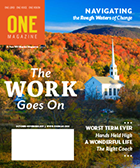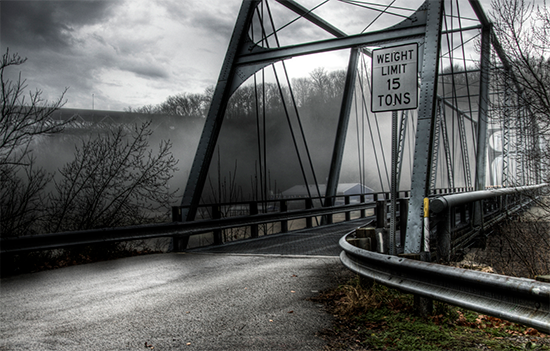
October-
November 2017
The Work Goes On
------------------
|






one to one: Lessons about life, ministry, and grandkids
by Keith Burden, Executive Secretary, National Association of Free Will Baptists
Divine Protection
I will forever be grateful for the strong work ethic my father handed down to me. During the school year while many of my friends were “sleeping in” on Saturdays, I was usually on the jobsite helping my dad with his carpentry work. The sense of responsibility and self-discipline I learned has served me well through the years.
On one particular occasion, my younger brother and I accompanied my dad to work on a remodeling project located about 35 miles from our home. We did some painting and spent the rest of the time cleaning up debris from around the job site. We finished mid-afternoon and started the 45-minute trip back home.
Our route led us over a two-lane bridge spanning a section of the Arkansas River Kerr Navigational System. Upstream, the Army Corp of Engineers had built a lock and dam system for barges that navigated that canal with their cargo. The bridge was constructed with an arch configuration so oncoming traffic was not visible until you reached the pinnacle of the structure.
As we cruised over the bridge in my dad’s pickup truck that afternoon, he glanced to his left, watching barges floating downstream. I was looking to the right at the lock and dam. My brother was asleep in the seat between us. For some unknown reason, I happened to look up and see we were rapidly approaching another pickup directly in front of us. It was moving very slowly. We were traveling at a rate of 65 miles per hour. I yelled, “Dad, look out!”
What happened in the next few seconds seemed to transpire in slow motion. My father slammed on the brakes and instinctively swerved to the left to avoid a direct hit with the other vehicle. The right-front section of our pickup hit the left-rear section of the other pickup. The bone-jarring impact reduced our speed significantly; yet, the glancing blow propelled us against the curb on the opposite side of the bridge.
Somehow, my father was able to steer the pickup back into the appropriate lane of traffic and eventually bring it to a stop. As we sat there in stunned silence, I remember the distinct smell of burned rubber and radiator fluid. Momentarily, we exited the vehicle and checked on the other driver. Amazingly, he was not injured—only shaken up!
Several minutes later, a highway patrol officer arrived on the scene. Both disabled vehicles were towed away. I remember the patrolman saying, “You sure were lucky today.” We were not wearing seatbelts, and the collision could easily have ejected us through the windshield. The pickup didn’t flip over the bridge guardrail. We narrowly missed an oncoming tractor-trailer approaching in the other lane. The fact that we walked away from the accident unscathed was nothing short of a miracle.
From my point of view, luck had nothing to do with it. Everyone has an occasional brush with danger. Often, we aren’t aware we are in harm’s way. We take God’s protection for granted. We shouldn’t. I’m not suggesting we should be paranoid and live in fear. After all, He has promised to watch over our comings and goings (Psalm 121:8). Neither should we be presumptuous or oblivious to the perils around us.
We would do well to adopt the prophet’s perspective on this matter: “It is of the Lord’s mercies that we are not consumed, because His compassions fail not. They are new every morning: great is Thy faithfulness” (Lamentations 3:22-23).
Thank God for His divine protection.
About the Column
One to One is a regular feature of ONE Magazine. Written by Keith Burden, executive secretary of the National Association of Free Will Baptists, the column explores life, ministry...and the joys of grandchildren.
|
|

